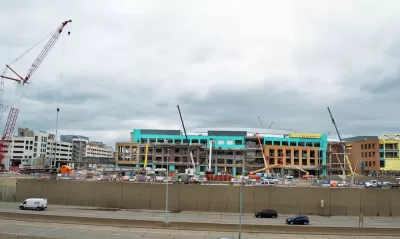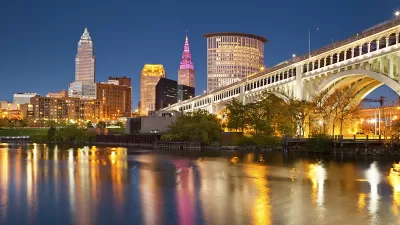The “Transformational Brownfield” incentives approved by the Detroit City Council for the $1.5 billion District Detroit still require approval by the state.

The Detroit City Council approved a $616 million “Transformational Brownfield” development incentive for the $1.5-billion District Detroit project, proposed by the Ilitch organization's Olympia Development of Michigan and New York-based Related Cos.
According to an article by Dana Afna and JC Reindl, most of the development incentive included in the project’s community benefits agreement would generate revenue by capturing future state-level taxes, “including state income taxes paid by workers and residents in the planned buildings.”
“The balance would come from future property taxes that would otherwise go to the Downtown Development Authority, or DDA,” according to the article.
“Separately, the developers also will get from the DDA a $23.7 million forgivable loan and $25 million in cash reimbursement for infrastructure improvements.”
The Transformational Brownfield incentive will still require approval by the Michigan Strategic Fund.
The District Detroit development proposal, which has been on the books for a decade, “calls for 10 new and rehabilitated buildings for 1.2 million square feet of office space, 695 apartments, retail spaces and two new hotels: a 14-story, 290-room hotel adjacent to Little Caesars Arena and an adaptive reuse of the 10-story Fox Theatre office building, 2211 Woodward, as the 177-room Fox Hotel,” according to the article.
The article, linked below, provides more details on the politics of the community benefits agreement approved by the city this week.
FULL STORY: City Council OKs incentives for $1.5B District Detroit

Study: Maui’s Plan to Convert Vacation Rentals to Long-Term Housing Could Cause Nearly $1 Billion Economic Loss
The plan would reduce visitor accommodation by 25,% resulting in 1,900 jobs lost.

North Texas Transit Leaders Tout Benefits of TOD for Growing Region
At a summit focused on transit-oriented development, policymakers discussed how North Texas’ expanded light rail system can serve as a tool for economic growth.

Why Should We Subsidize Public Transportation?
Many public transit agencies face financial stress due to rising costs, declining fare revenue, and declining subsidies. Transit advocates must provide a strong business case for increasing public transit funding.

How to Make US Trains Faster
Changes to boarding platforms and a switch to electric trains could improve U.S. passenger rail service without the added cost of high-speed rail.

Columbia’s Revitalized ‘Loop’ Is a Hub for Local Entrepreneurs
A focus on small businesses is helping a commercial corridor in Columbia, Missouri thrive.

Invasive Insect Threatens Minnesota’s Ash Forests
The Emerald Ash Borer is a rapidly spreading invasive pest threatening Minnesota’s ash trees, and homeowners are encouraged to plant diverse replacement species, avoid moving ash firewood, and monitor for signs of infestation.
Urban Design for Planners 1: Software Tools
This six-course series explores essential urban design concepts using open source software and equips planners with the tools they need to participate fully in the urban design process.
Planning for Universal Design
Learn the tools for implementing Universal Design in planning regulations.
Ascent Environmental
Borough of Carlisle
Institute for Housing and Urban Development Studies (IHS)
City of Grandview
Harvard GSD Executive Education
Toledo-Lucas County Plan Commissions
Salt Lake City
NYU Wagner Graduate School of Public Service




























